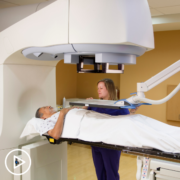Should Prostate Cancer Screening Happen at an Earlier Age for Certain Patient Populations?
Should Prostate Cancer Screening Happen at an Earlier Age for Certain Patient Populations? from Patient Empowerment Network on Vimeo.
Should prostate cancer screening be done sooner for some men? Expert Dr. Leanne Burnham details screening guidelines from the American Cancer Society and the U.S. Preventive Services Task Force, how guidelines differ for Black men, and when to advocate for earlier screening.
See More From the Prostate Cancer TelemEDucation Empowerment Resource Center
Related Resources:
Transcript:
Dr. Leanne Burnham
In terms of prostate cancer screening, the current recommendation by the U.S. Preventive Services Task Force is that men between the ages of 55 to 69 have a discussion with their physician about whether or not they should be screened. Okay, now the U.S. Preventive Services Task Force base this decision on studies, as I mentioned earlier, in predominantly white men, if you look at American Cancer Society, the recommendation is that African American men are screened at age 45 and African American men who are 40, but have a family history of prostate cancer should be screened at age 40. So the issue is most physicians follow the U.S. Preventive Services Task Force recommendation for white men. And so, if you have a family history, or if you’re just 45 and you want to know, do you have prostate cancer, you have the right to ask your physician and let them know. Show them on your phone, American Cancer Society recommends this for me because of my race, because of my family history, and your insurance will cover that. Now, these recommendations for Black men in their 40s are not just for no reason, it’s because we see prostate cancer in men at this age, like I said before, my dad being diagnosed at 50 with a PSA score of 64 means that he was growing prostate cancer in his 40s, and who knows how early in his 40s if that was happening. At City of Hope, we provide free prostate cancer screening in the community, and there’s thousands of men that are eligible to be screened, and what we see is there are men in their 40s that have elevated PSA, and if we can catch that early enough, that’s a game changer for them in terms of the length of their life and the quality of their life that they’ll have moving forward.
So, one thing that we see in the community, and I talk to a lot of men about, is not even just men, people in general, trust their doctor, right, they trust to speak to their physician. If the physician says, “It’s your annual visit, you need to have A, B, and C done.” A lot of the men, they’ll say, “Oh, I went to the doctor, I had everything done,” and we really have to let them know your doctor may not have included that with everything else. Yes, you’ve got your blood pressure checked, your blood sugar, and they checked your weight and all this, but go through your record, and a lot of these records are electronically available in apps now and see. Just look at your app and see, did they test for PSA? And if they didn’t and you’re 45 and you’re African American or you’re 40 and you have family members, then that’s something you can shoot your doctor an email and request and just say, “You know, I’m concerned about this, and I would really like to have this test done based on American Cancer Society’s recommendations.” And what we see a lot of times too in the community, is men will say, “Well, I feel fine.”
Well, what you need to understand about prostate cancer is, men do not have symptoms unfortunately until it is beyond early stages is how it works, and so as men get older, the prostate enlarges, whether or not they have prostate cancer or not, and it causes a frequency in urination especially at nighttime. So, if you have a frequency in urination, it will occur as you get older, that’s something you need to let your doctor know. It may not be prostate cancer, so don’t freak out, but it very well may be other symptoms as prostate cancer progresses include back pain, sometimes sexual dysfunction, things like that start to occur, and back pain can be anything. So that’s why it’s important to get your PSA tested even if you don’t have symptoms, because I can tell you that, my dad did not have any symptoms with a PSA of 64, and the only reason I found that was on accident in an emergency room, he went to the ER after having a colonoscopy. And my dad never got sick for anything that he didn’t even understand what physical discomfort means, and he had a colonoscopy, and you know, when you get a colonoscopy, they tell you afterwards, you may have some gas pain, he never had gas pain. So, he didn’t know when his stomach was hurting so bad afterwards, he just thought, this is not okay, this is not okay, he goes to emergency room, they say, Listen, sir, it’s just gas from your colonoscopy, by the way, we ran your blood work, your PSA is extremely elevated. He found out on accident. Who knows how much longer that would have been growing after that, and so I say all that to say, do not expect, do not wait for symptoms to come, and that Black men do get prostate cancer young and that you wanna catch it early because then you have a 100 percent cure rate when you catch it early, so it just makes the most sense to stay on top of it.










